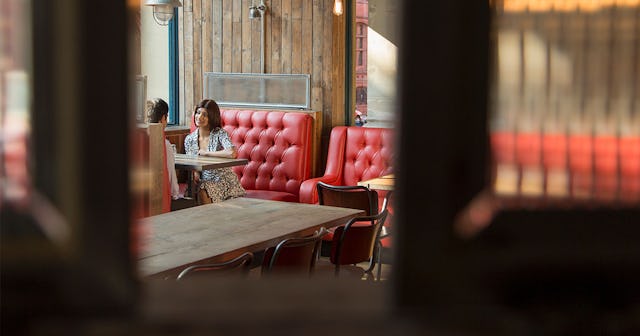The Real Reason I Kept The Truth About My Dating A Secret

I remember only a few specific details from my forty-year-old husband’s funeral: the college friends who handed me glasses of wine, the mom friends who handed me bottles of water, the family members who reminded me to eat … and the random stranger (realistically, not a stranger, just a very loosely connected friend) who assured me that I was young and would meet somebody new.
I was young for a widow — just thirty-five, but what does age have to do with it? I couldn’t imagine meeting “somebody new.” There was so much inherently wrong in that statement, starting with the fact that people aren’t replaceable and ending with the fact that the last thing I want to think about at my husband’s funeral is another man. I simply put that statement out of my mind for the next few years.
I focused on my children, on myself, on trying to navigate a world I was wholly unprepared to navigate. When I did begin to think about “meeting somebody new,” I wasn’t focused on the fact that I was young or that I wanted a replacement for the man I’d lost. I simply wanted connection, and love, and to feel like I wasn’t traveling this life alone forever. And then a friend suggested I join an online dating service. And then I went on a first date. And then eventually a second. And then suddenly I was dating someone … and, to my surprise, desperate to keep it a secret.
If pressed to rationalize why I was so desperate to keep the fact of my dating a secret, there are a few surface reasons I might give. One, that I was embarrassed. The first time I was in the dating scene, online dating was the fringe, not the norm. But while, yes, it took time to mentally recalibrate to the fact that online dating was now standard, I wasn’t embarrassed to be dating.
Two, being open about the fact that I was dating also meant opening myself up to critiques, judgments, and well-meaning suggestions by people who actually had no way of understanding the mind and world and heartbreak of a young widow. There will be those who think I started dating too soon, and those who think I waited too long. Those who think I should do one thing and those who believe I should do the exact opposite. Taken together, that’s a lot of extra noise that I don’t need. But, in reality, in my young widowhood cutting out noise has become a superpower. When you’re your children’s only parent and you’re living a life that was meant to be lived by two, you get good at cutting out noise.
Three, admitting I was dating also meant admitting I was being rejected. That’s the reality of dating. One day you’re dating someone, and the next, you’re not. Young widowhood takes a heavy toll on self-esteem — I don’t know why, but it does — and the thought of being rejected, of being told I wasn’t good enough, was terrifying. The thought of being rejected and seeing the pity on friends’ faces was a thought too heavy to bear.
But the truth is, none of those reasons accurately explains why I felt desperate to keep the fact of my dating a secret from friends, family, and acquaintances. The real reason I wanted to keep my jump (stumble?) into the dating world a secret was simple: I still loved my husband.
I was afraid that admitting to the fact that I was dating would send a message that I had stopped loving or missing my husband, or that my grief was somehow over. Which matters, not because I want to collect sympathy for as long as possible, and not because I want to be a martyr, but because it wouldn’t be true. Because my loss will never be something I’ve “gotten over,” and his death will never be something that’s simply a part of my past. It will be something I carry with me, something that defines me and makes me see the world in a way I didn’t before. More than that, it’s something I want to carry with me because it’s one of the few things I have left of him.
The truth is, I was afraid to admit that I was dating because I didn’t want some random stranger (or a loosely connected friend) to believe the grief was over because I was “young and met somebody new.” I couldn’t bear the idea that someone somewhere might believe I had stopped loving my husband while making space to maybe love someone new.
But maybe all of that is just noise, too. Like the critiques, judgments, and well-meaning suggestions I mentioned above, maybe the possibility that some unknown someone somewhere believing my grief is over doesn’t really matter, as long as I know the truth. Losing a spouse is a loss that is mired in contradictions, in dualities. Every happy moment is lined with grief. Every moment of grief is often accompanied by the memory of a love that knew no bounds. And nowhere are the contradictions more apparent than in this — a widow (or widower) hoping for or excited about a new love, while forever grieving a love that was lost. Because it’s possible to miss the past and hope for a happy future. It’s possible because our hearts are capable of making space for all the love we’re willing to accept.
This article was originally published on